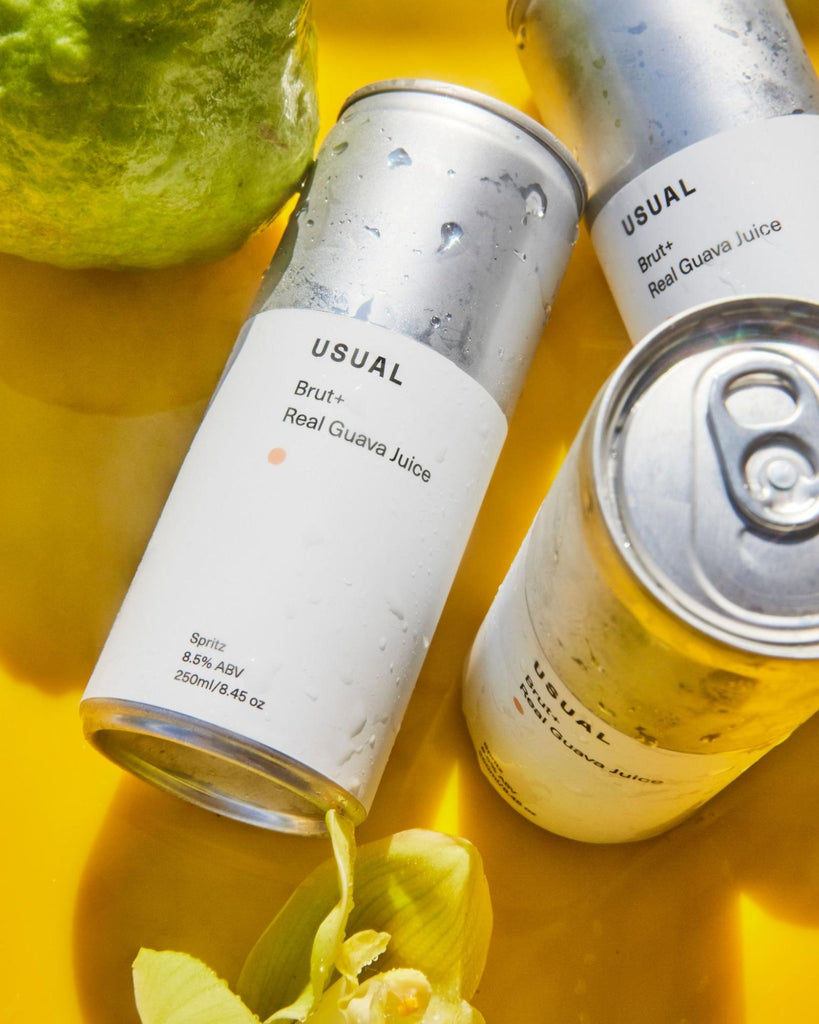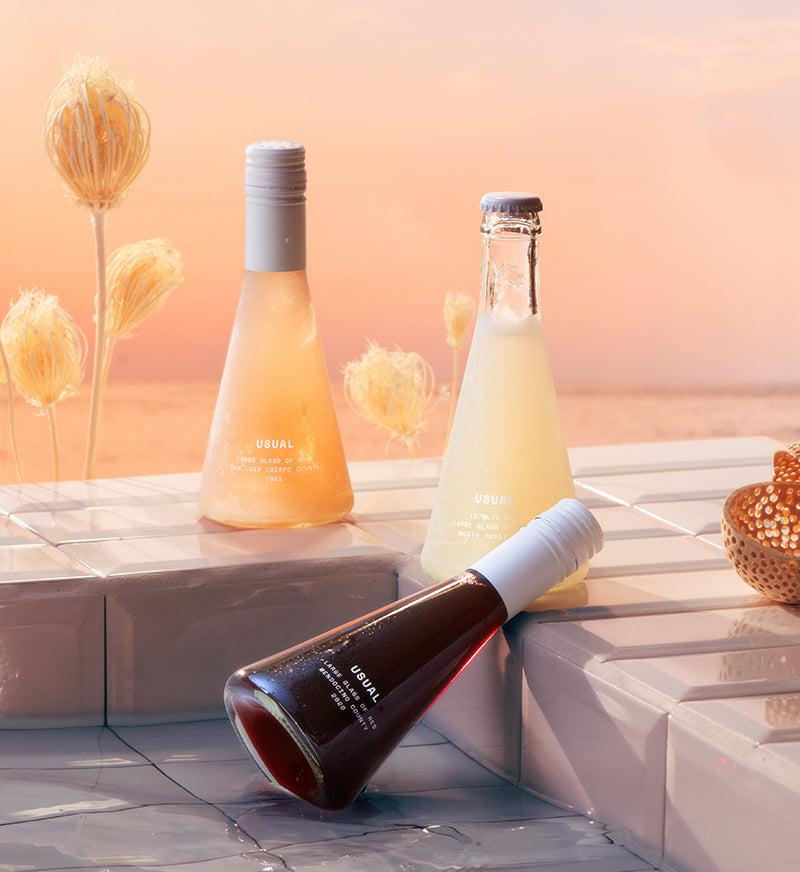Your cart looks a little empty!
Continue Shopping
What Is Hard Seltzer? The Truth About This Fizzy Fad
McKenzie Hagan |
Whether it's television and YouTube commercials or social media posts, it's hard to escape the latest alcoholic beverage craze: hard seltzer. From the wildly popular triumvirate of White Claw, Bon & Viv, and Truly Hard Seltzer to mainstream beer brands like Bud Light, Corona, and Michelob Ultra, it's clear that the hard seltzer market is having a moment — a really big moment.
In 2019, hard seltzer sales were at $4.4 billion and those figures are expected to climb more than 16% from 2020 to 2027. But what is hard seltzer, exactly? And is it true that it's a healthier option than high-calorie, high-sugar booze? Join us as we find out what the buzz is all about with this bubbly beverage.
A Deep Dive: What Is Seltzer Alcohol?
Also known as spiked seltzer, alcoholic seltzer, or hard sparkling water, hard seltzer is carbonated water combined with alcohol and fruit flavoring. Depending on the hard seltzer brand, these fruit flavors can come from real fruit juice or artificial flavoring.
Hard seltzers usually come in a variety of unique flavors. These include citrus, berries, and tropical fruits. Flavors like black cherry, guava, passion fruit, and kiwi are common among many brands, providing a diverse array of options to suit different taste preferences.
Some of the most common flavors include a variety of citrus, berries, and tropical fruits, such as:
- Black Cherry
- Blood Orange
- Cranberry
- Guava
- Hibiscus
- Kiwi
- Lemon Lime
- Mango
- Passion Fruit
- Peach
- Pineapple
- Raspberry
- Ruby Grapefruit
- Strawberry
- Watermelon
Pro tip: To make sure you're getting a seltzer that hasn't been spiked with chemical additives or added sugars, always check the ingredients label. You may also have to do a little online sleuthing to learn about the hard seltzer brand's production processes and make sure what you see is what you get.
Understanding the Process: How Is Hard Seltzer Alcohol Made?
As with any alcoholic beverage (including your favorite bottle of wine), the key to its boozy nature lies in the fermentation process. That's when yeast consumes any sugars that are present and converts them into alcohol. In winemaking, those sugars come from harvested grapes. For hard seltzer, it typically comes from straight-up fermented cane sugar. It could also come from malted barley, although technically that would make it a flavored malt beverage like Smirnoff Ice.
Pro tip: Most alcohol seltzers are gluten-free, but if you see the words "malt," "barley malt," or "malted" anywhere on the label, it has gluten.
The trend of hard seltzers indicates a shift in consumer preferences towards ready-to-drink beverages. These are pre-mixed drinks that provide a convenient alternative for consumers who want to enjoy an alcoholic beverage without the hassle of making one from scratch.
The alcohol content of most spiked seltzers falls in the range of 4-6% alcohol by volume (ABV) — about the same as light beer — although some can be as high as 12% ABV, which is the same amount as the standard five-ounce serving of wine.
Lower alcohol also means fewer calories. Most hard seltzers come in 12-ounce cans and hover around the 100-calorie mark. The amount of sugar varies from brand to brand, but you'll usually find the most popular hard seltzer brands touting their low-sugar content, which tends to be no more than 3 grams of sugar per serving.
Is Hard Seltzer a Healthy Drink?

While it would be a misnomer to say that spiked seltzer is a healthy drink that should be part of your daily wellness routine, it could be considered a healthier option to traditionally sugary drinks such as soda, wine coolers, and fruity cocktails.
Part of the reason why spiked seltzer is so popular is that it checks off a lot of the boxes for health-conscious consumers. You know the boxes we're talking about: gluten-free, low-calorie, low-sugar, low-carb, and low-alcohol.
Although hard seltzer is usually made from fermented cane sugar, most of that sugar is converted to alcohol, which is why the sugar content often remains on the lower side. Also, because these canned sippers come in single-serving sizes, there's built-in portion control. (As long as you don't end up gulping can after can just because you ... well, can.)
It’s also worth noting that even if there is real fruit juice in the seltzer, the amounts are so miniscule that you’re not getting any nutritional benefits.
Pro tip: If you're counting calories, limiting carbs, or taking "Dry January" to the next level, don't miss our guides to low-carb wine, low-alcohol wine, and non-alcoholic wine.
Natural vs. Added Sugar in Seltzer
While clever marketing ploys can make just about anything sound like a good idea (remember the internet-breaking Chipotle #GuacDance? Yeah, we'd like to forget it too), don't assume that every drink labeled hard seltzer is automatically good for your health.
For instance, there could still be other sugars, like agave or corn syrup, to enhance the flavor, not to mention chemical additives to extend the shelf life. Even if your spiked seltzer is made with "natural sugar," the bitter truth is that things aren't always what they seem.
As researchers at Harvard point out, "classifying sugars as added or natural doesn’t tell the whole story." If drinks contain sugars that come from fruit, they are termed natural. However, the manufacturers often alter the fruit’s properties, thus changing "the way our bodies process the sugar contained in the fruit, which has key implications for our health."
Knowing this, it becomes even more important to pay attention to the source of your cute little can of fizzy fun. Is the brand transparent about its practices? Is it merely a mainstream, commercial brand wrapped in pretty packaging and slick advertisements? Where are the ingredients sourced?
FYI, here at Usual Wines, we're very clear (and clean) about how we do things. Every one of our personal-sized vinos is made from small batches of sustainably farmed grapes with absolutely no chemical additives or added sugars, and minimal intervention. We like to do things the Old World way so you know just what you're getting — and what you're not.
Exploring Hard Seltzer Alternatives

If you're not sure hard seltzer is the fad for you, there are plenty of other low-sugar, low-carb, and low-calorie sparkling options to consider.
You could opt for dry, sparkling wines that keep sugar and carbs to a minimum and still give you that carbonated experience. Take our Usual Brut, for instance. This dry, crisp, and refreshing sparkling wine will tingle your taste buds thanks to 6,124 bubbles in every bottle (yes, we counted) and refreshing notes of lemon, bergamot, and elderflower. Oh, and let's not forget the zero grams of sugar, 1.5 grams of carbs, and 110 calories per serving.
There's also our limited edition semi-sparkling rosé you'll want to sip all day, and our upcoming canned wine spritzer, sweetened with grapes for a natural, healthier, and irresistibly flavorful alternative to hard seltzer.
And then there's our Usual Spritz, a crisp, bubbly, fruity, low-alcohol sparkler, conveniently contained in a can. Made with 100% guava juice and 0% added sugar, it clocks in at just 3 grams of natural sugar and 83 calories per serving. If it happens to be sold out (hey, with drinks this good, it's bound to happen), simply provide your email address and we'll notify you when our next release is ready.
You can also create a DIY hard seltzer alternative by combining some of your favorite wine with seltzer water. Consider it your own bespoke spritzer.
Understanding the Appeal: What Are Seltzers All About?
What is hard seltzer? Now that you know the answer to that question (carbonated water mixed with alcohol and fruit flavoring!), you might be asking yourself if it's worth the hype. We love cracking open a can of fizzy drinks as much as the next person (OK, maybe more), and we firmly believe that variety is the spice of life. But just as with most things you encounter, don't forget to read the fine print.
The environmental impact of hard seltzers should not be overlooked. The production of these beverages often involves significant water usage and carbon emissions, not to mention the waste produced by their packaging. It is, therefore, important to opt for brands that are committed to sustainability and mindful production processes.
Hard seltzer seems like an appealing option when you look at all the healthy qualities it offers — fewer calories and carbs, lower alcohol, gluten-free ingredients, and low sugar content — but you have to look deeper. Not all sugars are created equal and not all hard seltzer brands are transparent about how they source their ingredients. Once you get more details, then you can make the right decision for your lifestyle.Share
